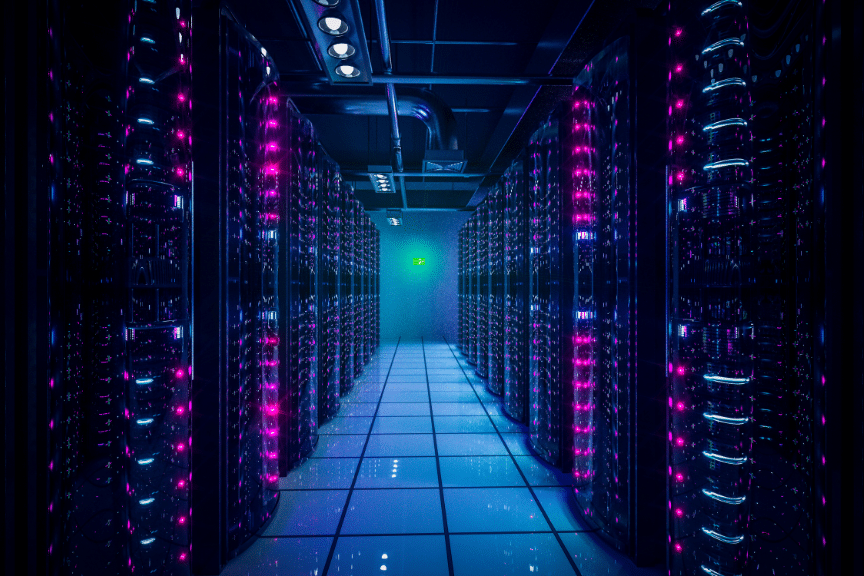Data Center Management: A Guide to IT Operations

Data centers serve as the critical backbone of business technology infrastructure. These facilities, whether they are on-premise server rooms, part of a colocation campus, or virtualized environments, play a pivotal role in the day-to-day operations of businesses across the globe. Effective management of these data centers is crucial as any downtime or inefficiency can lead to significant financial losses and operational disruptions.
Table of Contents
Understanding Data Center Management
Data center management refers to the process of overseeing and ensuring the effective operation of the physical and virtual infrastructure that houses computing resources like servers, networking systems, storage devices, and data security elements. It also involves managing data storage and flow and ensuring that all systems are optimized for efficient access to mission-critical workloads and cloud solutions. Typically, this responsibility falls on data center managers or a dedicated team tasked with keeping the facility running smoothly and efficiently.
Key Responsibilities in Data Center Management
The core responsibilities in managing a data center include:
- Hardware and Software Maintenance: Regular updates, installations, and maintenance of all data center equipment and software are vital to prevent failures and ensure operational continuity.
- Connectivity Solutions: Establishing reliable connections with external parties through Internet Service Providers (ISPs) and Network Service Providers to ensure seamless data flow.
- Data Management: Overseeing the storage, distribution, and overall management of data to ensure accessibility and security.
- Backup and Disaster Recovery: Implementing robust backup systems and disaster recovery plans to safeguard data integrity and availability during unforeseen events.
- Technical Support: Providing daily technical support and, in some cases, additional emergency support outside of standard operating hours.

What is DCIM (Data Center Infrastructure Management)?
Data Center Infrastructure Management (DCIM) represents a significant evolution in data center management, centralizing the management processes using specialized tools, sensors, hardware, and software. DCIM tools enable data center operators to efficiently manage the infrastructure, ensuring that everything from power consumption to cooling systems and server operations is functioning optimally. These tools provide real-time data that helps managers make informed decisions about resource allocation, system changes, and infrastructure scaling.
Challenges in Data Center Management
Despite the advancements in technology, managing a data center comes with its set of challenges, particularly in agile and dynamic business environments:
- Legacy Systems: Integrating and maintaining aging infrastructure with newer technologies without disrupting current operations.
- Service Level Agreements (SLAs): Ensuring all SLAs are met consistently, especially when they vary across different applications and services.
- Resource Management: Balancing IT resource allocation in terms of power, capacity, and cost-effectiveness.
- Vendor and Contract Management: Dealing with multiple vendors and managing several contracts, licenses, and SLAs can be cumbersome.
Advantages of Efficient Data Center Management
A well-managed data center can bring numerous benefits to businesses, driving internal digital transformation and operational efficiency:
- Asset Management: Precise definition and identification of all assets within the data center, allowing for better resource and capacity planning.
- Cost Efficiency: Significant cost savings through optimized power usage and efficient resource deployment.
- Operational Agility: Enhanced ability to roll out new processes and technologies quickly, facilitating faster response to market changes.
- Strategic Partnerships: Building relationships with third-party service providers to expand service capabilities and reach.
The Future of Data Center Management
The future of data center management is leaning towards more automation and integration of artificial intelligence (AI) and machine learning (ML) technologies. These advancements promise to further streamline data center operations, reduce human error, and predict potential system failures before they occur, thus enhancing overall efficiency.
Conclusion
Data center management is an essential function within modern IT operations, requiring a blend of technical skills, strategic planning, and operational oversight. As technology evolves, so too does the complexity of managing these critical facilities. However, with the right tools and practices in place, businesses can turn their data centers into robust engines that support their growth and innovation strategies.
By embracing advanced management techniques and technologies, companies can ensure their data centers are not only meeting today’s demands but are also prepared for future challenges and opportunities in the digital landscape.



